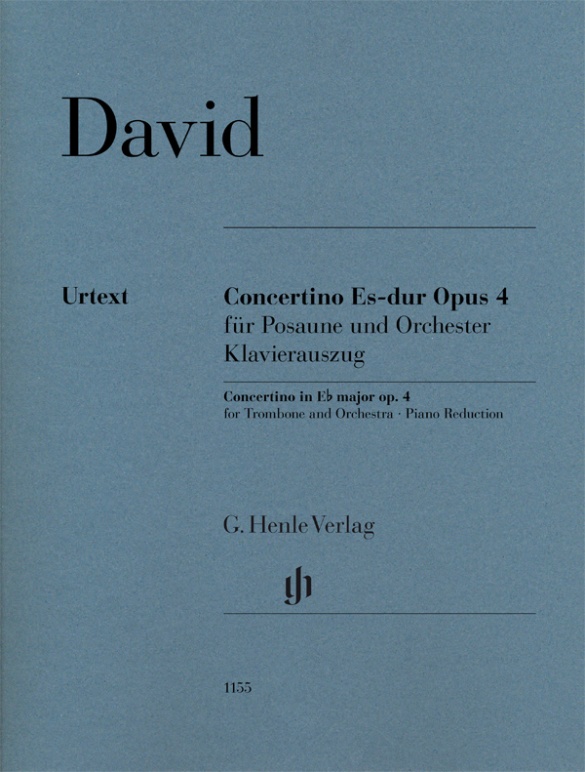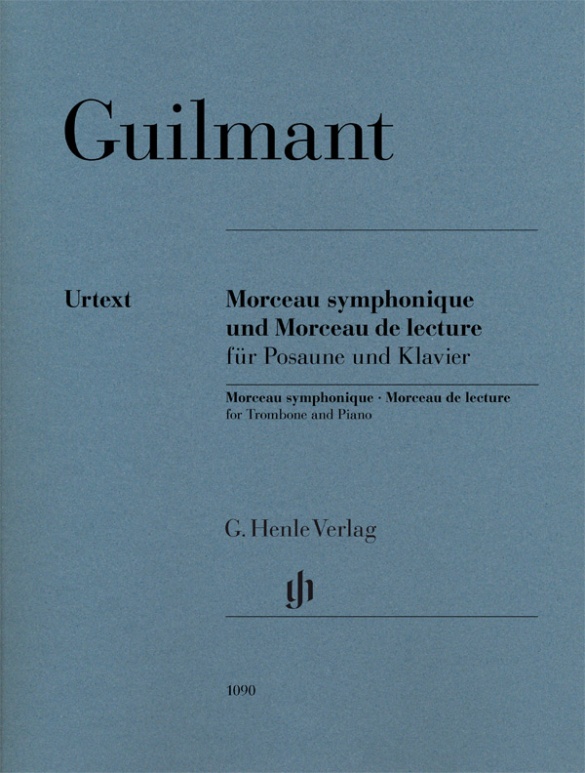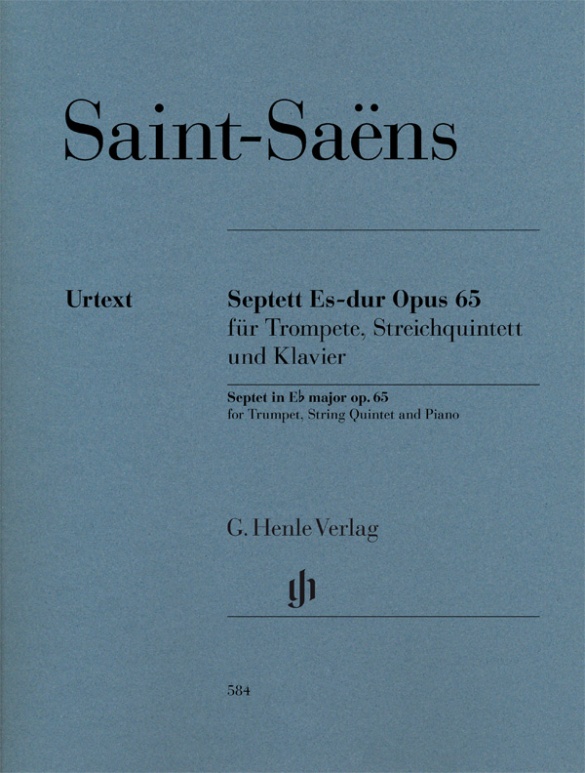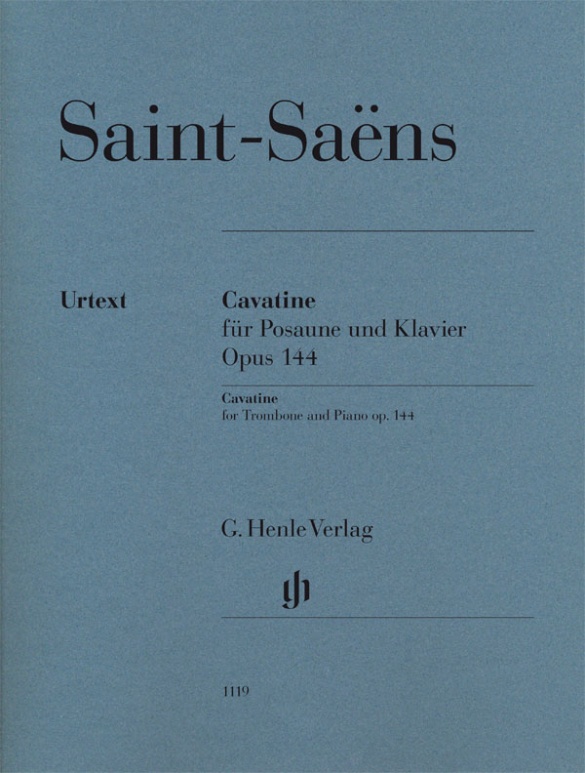

Camille Saint-Saëns
Cavatine for Trombone and Piano op. 144
Camille Saint-Saëns was always trying to expand the rather sparse repertoire for chamber music for wind instruments, something that is not least also shown by his three late wind sonatas for oboe, clarinet and bassoon respectively (HN 964, 965, 966). The trombone also came into its own as a solo instrument with the Cavatine, composed in 1915.
It displays here its lyrical, romantic side. To date the Cavatine, an effective recital piece, is a milestone in the solo literature for advanced trombone players. Our Urtext edition is the first to take into account also the autograph in Paris.
Content/Details
About the Composer
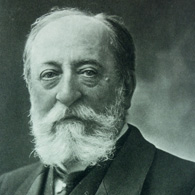
Camille Saint-Saëns
Saint-Saëns was one of the most multifaceted musicians of the second half of the nineteenth century in France. Regarded as a Classicist, he also wrote pieces with an Impressionist character to their sound, and one composition in quarter-tones. As a critic and essayist he was involved in the first complete editions of Rameau’s and Gluck’s works.
| 1835 | Born in Paris on October 9. Early comprehensive education. |
| 1848–52 | Studies at the Conservatoire de Paris. |
| 1853 | Organist at St. Merry Church in Paris. |
| 1853–59 | First large-scale works: Symphony No. 1, Op. 2 (1853), and No. 2, Op. 55 (1859); Piano Concerto No. 1, Op. 17 (1858); Violin Concerto No. 1, Op. 20 (1859); Mass, Op. 4 (1856); he attempts to arrive at unique forms. |
| 1857–77 | Organist at La Madeleine in Paris. |
| 1861–65 | He teaches at the École de Musique Classique et Religieuse Niedermeyer. |
| 1871 | Founding of the Société Nationale de musique. |
| 1871–77 | Composition of symphonic poems “Le rouet d’Omphale” (“The Wheel of Omphale,” 1871), “Phaéton” (1873), “Danse macabre” (1874), “La jeunesse d’Hercule” (1877). |
| 1876 | Attends the performance of the Ring in Bayreuth. |
| 1877 | Performance in Weimar of his opera “Samson et Dalila.” |
| 1881 | Member of the Académie des Beaux-Arts. |
| 1883 | Performance in Paris of his opera “Henry VIII.” |
| 1885 | Publication of the treatise “Harmonie et mélodie.” |
| 1886 | Performance in London of his Organ Symphony (Symphony No. 3 in C minor): major work with thematic transformation after Liszt’s model. Composition of “The Carnival of the Animals,” the publication of which he forbade during his lifetime. |
| 1899 | Publication of the book “Portraits et souvenirs.” |
| 1900 | Cantata “Le feu celeste” in praise of electricity, for the opening of the Exposition Universelle. |
| 1921 | Death in Algiers on December 16. |
About the Authors
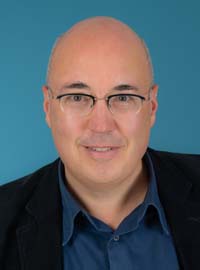
Dominik Rahmer (Editor)
Dr. Dominik Rahmer, born in 1971 in Mainz, studied musicology, philosophy and maths in Bonn. He did his Magister Artium in 1999 and his doctorate in 2006 with a thesis on the music criticism of Paul Dukas.
From 2001 to 2011 he was employed at Boosey & Hawkes/Bote & Bock in Berlin, where he also worked on the Critical Edition of the Works of Jacques Offenbach (OEK). Since 2011 he has been an editor at G. Henle Publishers in Munich, with a particular focus on French and Russian music and works for wind instruments.

Klaus Schilde (Fingering Piano)
Prof. Klaus Schilde, born in 1926, spent his childhood in Dresden. There he was greatly influenced by Walter Engel, who taught him the piano (Kodaly method), composition and violin. From 1946–1948 he studied at the music conservatory in Leipzig with Hugo Steurer. After moving to the west in 1952 he studied with Walter Gieseking and Edwin Fischer, as well as with Marguerite Long, Lucette Descaves and Nadia Boulanger in Paris.
Schilde won numerous prizes. From 1947 onwards he gave concerts as a soloist and chamber musician on almost every single continent with renowned orchestras. He taught at the music conservatories in East Berlin Detmold, West Berlin, Munich, Tokyo (Geidai) and Weimar. From 1988–1991 he was President of the Staatliche Hochschule für Musik und Theater in Munich, where he also taught for decades as a professor. There are numerous radio and television broadcasts with Klaus Schilde as well as CD recordings. Schilde has contributed fingerings to almost 100 Henle Urtext editions.
Prof. Klaus Schilde passed away on 10 December, 2020.
Product Safety Informations (GPSR)

G. Henle Verlag
Here you can find the information about the manufacturer of the product.G. Henle Verlag e.K.
Forstenrieder Allee 122
81476 München
Germany
info@henle.de
www.henle.com
Zusammenfassend darf man feststellen, dass die Summe der guten Eindrücke dieser neuen Edition keine Wünsche offen lässt.
Das Orchester, 2013recommendations
autogenerated_cross_selling
Further editions of this title
Further editions of this title


